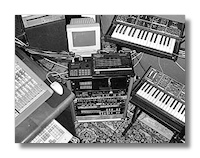
Keyboard moment in China's cultural evolution
By Petroc Trelawny 
As my plane makes its final approach into the southern Chinese city of Guangzhou, the mountains give way briefly to green paddy fields, and then industry takes over.
Beneath are hundreds of vast blue-roofed sheds and smoking red-brick chimney stacks. The landscape is mapped with rail yards and lorry parks; heavily laden barges crawl along the creeks of the Pearl River. With a vast economy that's now larger than that of nearby Hong Kong, Guangdong Province deserves its title as the factory of China. …
I've come to visit a company that last year made 100,000 pianos. The Pearl River Piano Company says it's now the world's largest: 3000 staff work on eight production lines, and it feels more like a car factory than a place making things as delicate and tactile as pianos.
A basic Pearl River piano costs about $1600, a fortune to many Chinese, but well within the budget of the country's burgeoning urban middle class. Their new wealth, combined with a desire to give their offspring a better childhood than they experienced, has led to an obsession with the piano in China. Conservative estimates suggest that 30 million Chinese children are learning the instrument; many reckon the figure is much higher. One academic told me the country was in the grip of piano fever.
Read more about this at The Australian website:
http://www.theaustralian.news.com.au/story/0,,23910488-16947,00.html




















